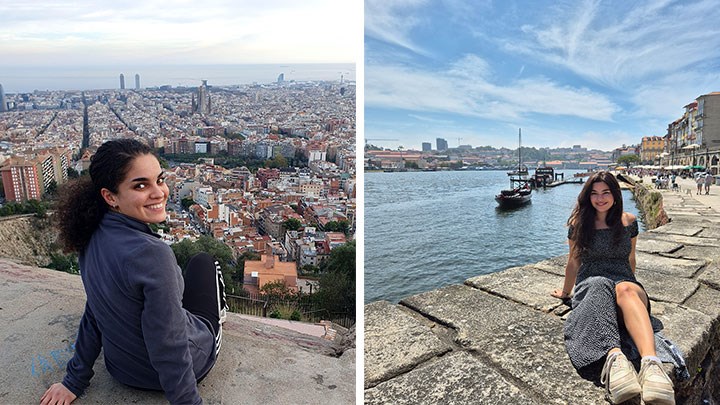Örebro students did their master’s thesis in Barcelona and Porto: “A fantastic opportunity"

Maria Absim and Gabriela Pereira studied in the international master’s programme in experimental medicine at Örebro University – and both applied for and received Erasmus funding to gather data and write their thesis abroad.
“Don’t overthink it, just say yes!” That is Maria Absim’s advice, who completed her master’s thesis in Barcelona through Erasmus+. “I’m delighted I did this because it was so fascinating and enriching,” she says.
Maria started by Googling to narrow down to a few potential research institutes or universities matching her specialisation. Her first email was to the research institute IRB Barcelona in February – and by November, she was on campus. She spent six months studying a protein linked to cancer and cardiovascular diseases in the lab.
Gabriela Pereira is just as happy that she took the chance to do her master’s thesis abroad. In her case, it was in Porto, Portugal.
“The process was quite straightforward. The coordinator of the master’s programme at Örebro University, my supervisors in Porto, and I agreed on what was expected from all parties,” says Gabriela.
“A fantastic opportunity to experience another country without pausing my studies. I’ve always been curious about Portugal, so being there and completing my degree was everything I could’ve wished for,” she says.
Gabriela joined a research group at the University of Porto focused on metabolic research. She discovered the project herself and got in touch with a supervisor.
“While I conducted my research independently, I received all the support I needed. I even participated in a national competition along with Portuguese students. It was amazing to see how the local students conducted their work,” she says.
Maria lived in central Barcelona and took their public transport system to get to the institute outside the city centre, which was very efficient.
“I learned a lot from my project and what it’s like to work in another country,” she observes.
The time with Erasmus+ is much more than just studies.
“Barcelona is a beautiful city with so much to offer – everything from museums and green parks to fantastic nightlife. There are even incredible hiking trails around the city,” says Maria.
“In addition to my studies, I also learned much about myself and what I appreciate in life. I made wonderful new friends and created memories for life.”
While Gabriela travelled around Portugal a bit during her stay, she says there is also a lot to enjoy at ‘home’:
“Student life in Porto is vibrant and full of traditions. Imagine that it’s the city that inspired J.K. Rowling to create Hogwarts. It’s amazing to see students dressed up in Harry Potter-like clothes throughout the city.”
She has some advice for newcomers.
“Get involved in social activities right away. Erasmus groups arrange many activities where you meet people in the same situation. Student housing also makes it easier to make new friends. And don’t forget to seek out groups with expats.”
Gabriela also appreciated spending time alone on the beach by the Duoro River, which flows through the city.
She wants to return to Portugal to meet her friends and see Porto again. After completing her master’s degree, she secured a job in a research lab.
Maria is also continuing her career in a clinical lab in Gothenburg.
“My dream is to continue researching, preferably cancer or inflammatory processes.”
About Erasmus+:
- Start by checking out Erasmus+ and contacting the International Office at Örebro University. Read more here (in Swedish).
- Consider which country and school you want to do your internship or data collection.
- Contact the organisation where you’re interested in doing your placement or collecting data. Including a cover letter and CV is a good idea.
- Next, complete an Erasmus+ scholarship application. The application must be filled in by you, your contact person at Örebro University, and a contact person at the receiving organisation. Then, send the application to the International Office no later than six weeks before the start of the activity.
- If you have a documented disability, have children, or want to travel sustainably, you can receive additional funding. Contact the International Office for more information.
- Check if student housing is offered or if you need to arrange accommodation yourself.
- Check that your insurance covers your entire stay.
- When you receive an Erasmus+ scholarship, you can also access a digital language course.
- Start the application process early, preferably a year in advance.
Text: Maria Elisson
Photo: Private
Translation: Jerry Gray
